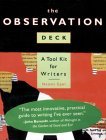- It is important to consider whether your protagonist’s cat should be referred to as an “it” or a “he”
- Always ask your trusted critic to read your manuscript earlier rather than later
- My opinion, or anyone’s, is just that–one opinion. Take or leave only what feels right to you.
- You may know that your character is obsessed with Garry Kasparov, but only put that detail in your story/novel if it has a purpose (which brings me to…
- Know why every detail in your work is there. If you don’t, find out or take it out
- Read your draft out loud. Yes, as if you are addressing the United Nations or just an audience of adoring fans
- Read other writers as much as possible (but if you’re like me, only read poetry or nonfiction while working on your fiction to prevent cross-breeding)
- Write. When I was beginning my first novel I met my goal of 10,000 words a month. Some days I’d write 3000, others 100, and still others none. (Which leads me to…
- Trust the process that works for you, but discover one and stick with it.
- If you don’t love it, don’t do it (kind of like, if you don’t surf, don’t start, only different)
Helpful and Even Inspirational Writing Books:
 Writing Toward Home: Tales and Lessons to Find Your Way | By the kind and lovely Georgia Heard
Writing Toward Home: Tales and Lessons to Find Your Way | By the kind and lovely Georgia Heard
Wild Mind: Living the Writer’s Life | By Natalie Goldberg
 The Observation Deck: A Tool Kit for Writers | By Naomi Epel
The Observation Deck: A Tool Kit for Writers | By Naomi EpelThe Anatomy of Story: 22 Steps to Becoming a Master Storyteller | By John Truby
What was the 9 month class? Were you student or teacher? I will head to your blog now.
Agreed with everything there. I read everything I write aloud. So far, the dog likes it, but the cat gets grumpy.Anyway, hope your work is going well. I’ve finally finished getting over the 9 month class I had over at ucla. God, that was such a haul.Go over to my blog and tell me what kind of items your action figure will have!
Thanks Bruce! I hope your work-in-progress is progressing well. CT
Hadn’t heard of a couple of these. Thanks for the recommendations.- B